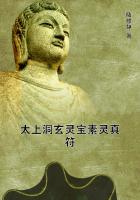The truth is, that the whole affair has been exalted by poets and romancers to an undue importance, and that love in its various developments is not a fitting object to consume the best energies of men. People set it before them and strive after it, because their view of life is as vulgar and brutish as is that other conception frequently met with in the lower stages of development, which sees in luscious and abundant food an end worthy of man's best efforts. Now, this is not right and should not be done. And, in order to avoid doing it, it is only needful to realize the fact that whatever truly deserves to be held up as a worthy object of man's striving and working, whether it be the service of humanity, of one's country, of science, of art, not to speak of the service of God, is far above and beyond the sphere of personal enjoyment. Hence, it follows that not only to form a liaison, but even to contract marriage, is, from a Christian point of view, not a progress, but a fall. Love, and all the states that accompany and follow it, however we may try in prose and verse to prove the contrary, never do and never can facilitate the attainment of an aim worthy of men, but always make it more difficult. This is my fifth contention.
How about the human race? If we admit that celibacy is better and nobler than marriage, evidently the human race will come to an end. But, if the logical conclusion of the argument is that the human race will become extinct, the whole reasoning is wrong.
To that I reply that the argument is not mine; I did not invent it. That it is incumbent on mankind so to strive, and that celibacy is preferable to marriage, are truths revealed by Christ 1,900 years ago, set forth in our catechisms, and professed by us as followers of Christ.
Chastity and celibacy, it is urged, cannot constitute the ideal of humanity, because chastity would annihilate the race which strove to realize it, and humanity cannot set up as its ideal its own annihilation. It may be pointed out in reply that only that is a true ideal, which, being unattainable, admits of infinite gradation in degrees of proximity. Such is the Christian ideal of the founding of God's kingdom, the union of all living creatures by the bonds of love. The conception of its attainment is incompatible with the conception of the movement of life.
What kind of life could subsist if all living creatures were joined together by the bonds of love? None. Our conception of life is inseparably bound up with the conception of a continual striving after an unattainable ideal.
But even if we suppose the Christian ideal of perfect chastity realized, what then? We should merely find ourselves face to face on the one hand with the familiar teaching of religion, one of whose dogmas is that the world will have an end; and on the other of so-called science, which informs us that the sun is gradually losing its heat, the result of which will in time be the extinction of the human race.
Now there is not and cannot be such an institution as Christian marriage, just as there cannot be such a thing as a Christian liturgy (Matt. vi. 5-12; John iv. 21), nor Christian teachers, nor church fathers (Matt. xxiii. 8-10), nor Christian armies, Christian law courts, nor Christian States. This is what was always taught and believed by true Christians of the first and following centuries. A Christian's ideal is not marriage, but love for God and for his neighbor. Consequently in the eyes of a Christian relations in marriage not only do not constitute a lawful, right, and happy state, as our society and our churches maintain, but, on the contrary, are always a fall.
Such a thing as Christian marriage never was and never could be.
Christ did not marry, nor did he establish marriage; neither did his disciples marry. But if Christian marriage cannot exist, there is such a thing as a Christian view of marriage. And this is how it may be formulated: A Christian (and by this term Iunderstand not those who call themselves Christians merely because they were baptized and still receive the sacrament once a year, but those whose lives are shaped and regulated by the teachings of Christ), I say, cannot view the marriage relation otherwise than as a deviation from the doctrine of Christ,--as a sin. This is clearly laid down in Matt. v. 28, and the ceremony called Christian marriage does not alter its character one jot.
A Christian will never, therefore, desire marriage, but will always avoid it.
If the light of truth dawns upon a Christian when he is already married, or if, being a Christian, from weakness he enters into marital relations with the ceremonies of the church, or without them, he has no other alternative than to abide with his wife (and the wife with her husband, if it is she who is a Christian)and to aspire together with her to free themselves of their sin.
This is the Christian view of marriage; and there cannot be any other for a man who honestly endeavors to shape his life in accordance with the teachings of Christ.
To very many persons the thoughts I have uttered here and in "The Kreutzer Sonata" will seem strange, vague, even contradictory.
They certainly do contradict, not each other, but the whole tenor of our lives, and involuntarily a doubt arises, "on which side is truth,--on the side of the thoughts which seem true and well-founded, or on the side of the lives of others and myself?"I, too, was weighed down by that same doubt when writing "The Kreutzer Sonata." I had not the faintest presentiment that the train of thought I had started would lead me whither it did. Iwas terrified by my own conclusion, and I was at first disposed to reject it, but it was impossible not to hearken to the voice of my reason and my conscience. And so, strange though they may appear to many, opposed as they undoubtedly are to the trend and tenor of our lives, and incompatible though they may prove with what I have heretofore thought and uttered, I have no choice but to accept them. "But man is weak," people will object. "His task should be regulated by his strength."This is tantamount to saying, "My hand is weak. I cannot draw a straight line,--that is, a line which will be the shortest line between two given points,--and so, in order to make it more easy for myself, I, intending to draw a straight, will choose for my model a crooked line."The weaker my hand, the greater the need that my model should be perfect.
LEO TOLSTOI.
IVAN THE FOOL















